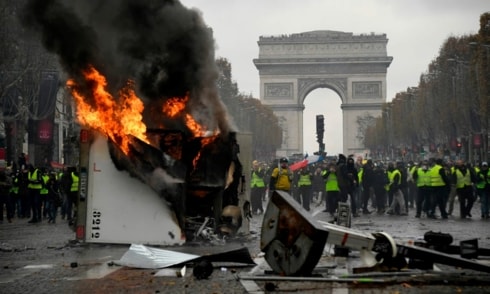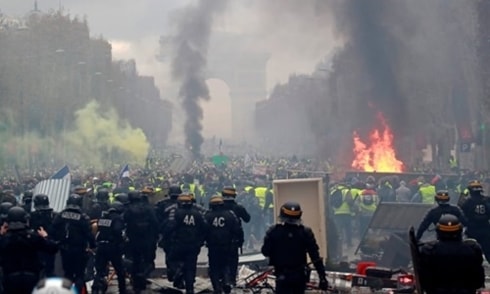Riots in France: “Yellow Vests” - Who are they? There are scoundrels too!
If it were just a group of people who were really struggling in life and needed to be heard, the “Yellow Vests” wouldn't have been so violent...
The anger of the masses
Unlike all previous street movements in France, the “Yellow Vests” are not a political or trade union movement.
No political party in France has control over the “Yellow Vests”. Nor has any trade union in France, famous for its protest power (such as the CGT, CFDT, FO)… been able to penetrate and control the “Yellow Vests”.
The “Yellow Vests” refuse to politicize or unionize their actions.
They even refused to show their face.
The “yellow vests” have no leadership. No spokesperson. No motto.
The “Yellow Vests” do not have any face of a dialogue factor. When any individual or group comes forward to claim to represent the “Yellow Vests”, that person and that group are immediately taken down by the crowd.
The “Yellow Vests” are, up to this point, truly a spontaneous mass movement, although it has become somewhat mixed and ganged up in the past few days and may become more tightly organized in the coming days as a real force.
 |
| Riot at Arc de Triomphe - Paris |
An “abandoned France”
But how would a typical “Yellow Vest” individual be described?
The Jean Jaures Foundation, one of the leading left-wing think-tanks in France, points out three prominent characteristics of the “Yellow Vests”: people who go hungry at the end of the month, live in the countryside or in small cities.
It is a gathering of people who make up another France, not in Paris or Lyon, angry at the feeling of being abandoned, surrounded by poverty and social injustice.
When the French government introduced a policy of increasing taxes on gasoline, with the aim of raising more money to finance a long-term strategy of transitioning to green energy industries, they did not expect that just a few dozen cents increase per liter of fuel would be enough to make the cup of anger overflow.
In rural areas or small towns in France, the car is almost the only option for getting around, especially for those who have to travel hundreds of kilometres a day to and from work. A few dozen cents more for fuel means a few dozen euros more at the end of the month. For those who earn the Smic minimum wage (1,153 euros after tax, and growing) or pensioners who rely on a few pennies, this is a problem.
More seriously, these people realize that, over the years, taxes have been rising, social benefits have been cut, purchasing power has been decreasing, and their voices have been increasingly ignored and despised. Between urban and rural France, the greatest inequality that exists is that of “mobility”.
Mobility here ranges from transportation (increased fuel prices, cuts to intercity rail lines) to opportunity. Since 2018, it has become increasingly difficult for rural and suburban students to get into big-city universities because the Parcoursup software creates a controversial geographic filter that sometimes gives an average student in the city priority over a good student in the suburbs or countryside.
And finally, after decades of uneven development, economic wealth accumulated in the large urban areas around Paris, Lyon, Toulouse… and left behind a rural France vast in territory but empty of wealth.
All those complexes, frustrations, angers... were not created by the young President Emmanuel Macron but were accumulated over the years from the previous presidents Chirac, Sarkozy, Hollande.
However, Mr Macron's arrogant and even insolent attitude, which was even considered "insolent" by pensioners, caused things to gradually spiral out of control.
The refrain “we will not give up our goal” that Mr. Macron, Édouard Philippe… have repeatedly said in recent days is seen as a contemptuous challenge to the protest movement, which, in essence, comes from the frustrations and legitimate demands of a large number of French people.
And now it all has a chance to explode.
The “yellow vests” now represent many different groups: low-wage workers, short-term contracts, pensioners facing increased CSG (social contributions), railway workers under threat of layoffs, students protesting against tuition increases and demanding reform of university entrance.
 |
| French police suppress riots. |
The scoundrels
But if it were just a group of people who were really struggling in life and needed to be heard, the “Yellow Vests” wouldn’t have been so violent.
The devastation in Paris on Saturday was a reflection of another problem in France: crime. Suburban crime, to be more precise.
These people are called “casseurs” – “wreckers”.
In all major street protests in France, there are always professional “casseur” groups. The sole purpose of these groups, as the name suggests, is to destroy, loot, and rob. And to blend in with the crowd, of course they also wear “Yellow Vests”.
These “casseurs”, combined with far-right or far-left groups, and sometimes even “black bloc” groups (specializing in black masks)… are the main culprits of violence.
These are opportunists, scoundrels, and scoundrels.
When the French are upset, they join in the vandalism. When the French are happy, like on the night of the 2018 World Cup victory celebration, they also vandalize. To loot, to rob, or just to attack the police for fun.
Of course, “casseurs” do not fall from the sky. Most “casseurs” are unemployed, poor suburban youths, always ready to commit crimes for a few pennies. The more arrogant ones, as we know from the Charlie Hebdo or Bataclan cases…, become terrorists.
This is, in fact, another serious illness of France, when social injustice, poverty, cultural-religious conflicts create another world in the suburbs – the world of crime.
When even 12-13 year old children participate in vandalism, looting, and theft, there is no reason or social outrage that can justify it.
These thugs are different from the truly angry “Yellow Vests”, but they are now being blended in. That is what makes the “Yellow Vests” so quickly ostracized by the French people, even though their support for the “Yellow Vests” has been steadily increasing over the past week.
But in reality at this time, when the Arc de Triomphe was also vandalized, the biggest challenge for all French people in general, from the people to politicians, is no longer the story of gas prices, poor purchasing power or social injustice... but the need to immediately end the wave of violence.
France cannot have another Saturday of riots, if it does not want to recreate a Revolution that even the initiators had no idea about./.

French President struggles to cope with the “yellow vest” crisis
(Baonghean) - In recent days, the center of the French capital Paris has fallen into the most serious unrest since 1968. This can be said to be the last straw after a series of days of protests by people and factions against President Emmanuel Macron's policies related to fuel prices, pension increases, and minimum wages.
